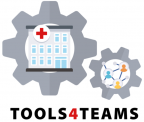Recruiting organisation: Centre for Resilience in Healthcare (SHARE), Faculty of Health Sciences, University of Stavanger, Stavanger
Supervisors: Prof. Karina Aase, Prof. Sissel Eikeland Husebø, Prof. Randi Ballangrud and Prof. Cordula Wagner.
Doctoral Candidate: Jicke Höök
Secondments: Amsterdam Public Health Research institute, Department of Public and Occupational Health, VUmc (3 months), and Netherlands Institute for Health Services Research (NIVEL) (3 months), Utrecht, The Netherlands.
Summary
The Multi-Team System (MTS) of the stroke patient trajectory is a dynamic and adaptive organisational structure composed of multiple interdependent teams that coordinate patient care across prehospital, hospital, and post-hospital settings. Effective collaboration within the MTS is essential to ensure seamless care transitions, patient safety, and optimal recovery outcomes.
Despite its critical role, significant knowledge gaps remain regarding the structure, coordination mechanisms, and team competencies that influence MTS performance. This PhD project aims to investigate, analyse, and enhance the MTS of the stroke patient trajectory by:
- Mapping the structure of the MTS, identifying strengths and areas for improvement.
- Examining patient handovers, analysing coordination challenges and enablers.
- Developing a tool to strengthen MTS competencies, supporting more effective teamwork.
A qualitative multi-method approach will be used. Observations in Studies 1 and 2 will capture team interactions, while Study 3 will employ focus groups to develop a practical tool to support collaboration.
Background
Stroke is a leading cause of death and disability worldwide, requiring rapid and coordinated care from multiple healthcare teams. The MTS of the stroke patient trajectory consists of prehospital emergency responders, hospital-based stroke units, and rehabilitation providers, all of whom must work together effectively.
The concept of MTSs (Mathieu et al., 2001) describes networks of teams that collaborate while maintaining distinct objectives. Although widely applied in healthcare, research on MTS functioning in stroke care remains scarce. To address this gap, this project will examine how teams within the MTS coordinate, communicate, and make decisions to support high-quality stroke care.
A recent concept analysis identified seven key competencies essential for MTS efficiency (Figure 1). Understanding how these competencies influence collaboration among teams and patient handovers in the MTS, will help identify barriers and enablers, improving coordination and transitions.

Figure 1. Key Competencies in Multi-Team Systems (MTS).
Approach
This PhD project follows a qualitative multi-method design with three interlinked studies:
Study 1: Mapping the MTS of the Stroke Patient Trajectory (Observational Study)
This study will examine MTS structure, identifying strengths and areas for improvement through observations of team interactions in prehospital, hospital, and post-hospital settings.
Study 2: Examining Transitions (Observational Study)
Patient handovers are critical moments of vulnerability. This study will explore how transitions are managed, focusing on coordination strategies, challenges, and opportunities for improvement.
Study 3: Developing a Tool to Strengthen MTS Competencies (Focus Groups)
Building on previous findings, this study will develop a practical tool to enhance communication, coordination, and collaboration. Focus groups with healthcare professionals will ensure relevance and feasibility in real-world settings.
Our research team
Centre for Resilience in Healthcare (SHARE) constitutes Norway’s largest research group studying quality and safety in healthcare and is affiliated with the Department of Quality and Health Technology at the Faculty of Health Sciences, University of Stavanger. SHARE’s strategic vision is to become an internationally recognized research centre by reforming the understanding of quality and safety in current healthcare systems. SHARE’s main pillar is a solid base of PhD scholars conducting research in areas such as interdisciplinary teamwork and competence, co-production and involvement, telecare, regulation, evaluation of improvement measures, and analysis of healthcare processes.
The doctoral candidate is a part of the multidisciplinary research group in SHARE consisting of 70 researchers, including nurses, medical doctors, psychologists, physiotherapists, occupational therapist, lawyers, sociologist, engineers, and safety scientists. The doctoral candidate is working in a Tools4Teams project group at SHARE involving another doctoral candidate, a project manager, and supervisors.
